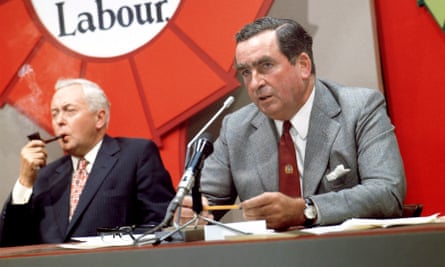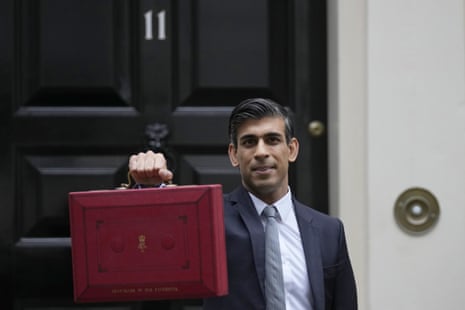Rishi Sunak is the Covid chancellor. Few outside Westminster had heard of him when he replaced Sajid Javid in the role in early 2020, but since then he has spent two years in charge of the government’s economic response to the pandemic. Now, as restrictions are lifted, he is the bookies’ favourite to replace Boris Johnson if the prime minister is forced to quit over partygate. It is a meteoric rise.
Since the second world war, only three former Conservative chancellors have made it to 10 Downing Street, and one of them, Winston Churchill, had left the Treasury more than a decade before the exceptional circumstances of 1940 won him the premiership.
Indeed, the list of postwar prime ministers Britain never had includes a long list of chancellors – both Conservative and Labour. Rab Butler, Roy Jenkins, Denis Healey and Ken Clarke were all big beasts who didn’t make it to the top job, suggesting the Treasury is not always the best government department to be running if you want to make and keep friends.
In the early part of the pandemic, Sunak’s political stock rose as quickly as one of Wall Street’s must-have technology stocks. It wasn’t just that he seemed to know what he was doing; what he was doing – spraying the economy with money – was popular. Not many chancellors say money’s no object, which was Sunak’s message when the economy went into its first lockdown.

In truth, he had no choice. Shutting people up in their homes in late March 2020 caused the economy to shrink by a quarter in just two months; without the furlough scheme and a variety of business support measures the damage would have been not just massive but permanent. There are times, normally when things are looking really bad, when the British state functions well – and this was one of them.
Life has become tougher for the chancellor since those early months in the job. He was keen to end the furlough in the autumn of 2020 but was then forced to extend it in one of a series of mini-budgets. The eat-out-to-help-out scheme in August 2020 was a gimmick that may well have reseeded the virus. The stamp duty holiday for property was unnecessary and has helped fuel a house price boom. Even so, the fact that unemployment is back to pre-pandemic levels and never reached the double-digit levels predicted by the Bank of England and the Office for Budget Responsibility is a real achievement. Sunak had a good war, which explains why he is the frontrunner to replace Johnson.
Peacetime brings its own set of challenges, though, especially for those who see themselves as the custodian of the nation’s finances. By the autumn of last year, it was no longer a case of “money no object” but rather of trying to reduce the government’s record deficit while providing scaled-back support for the economy.
As a result, furlough came to an end, the £20-a-week uplift to universal credit was removed and it was announced that extra money for the NHS and social care should come from raising national insurance contributions. The first of these – winding up wage subsidies – was a gamble that paid off; the UC and NI changes look a lot less clever against a backdrop of soaring energy prices, inflation at 5.4% and falling real wages. It is never good news for governments when prices are rising faster than incomes, which is why Sunak – assuming he has not moved next door by then – will be stumping up extra money in his latest mini-budget on 23 March.
So much has happened in the past two years that it is easy to forget this is still midterm in the current parliament, a time when governments tend to be unpopular. Even if 2022 is the stinker it threatens to be, there is still time for the Conservatives to pull things round by the time of a 2024 election. By then, the Bank of England expects inflation to be back close to 2%, there could be scope for tax cuts, and memories of Downing Street parties will be fading. The political calculation of those Tories who want Sunak to replace Johnson is that Labour’s opinion poll lead is a function of public unhappiness with the prime minister rather than any great affection for Keir Starmer.
That said, the longer Johnson clings on, the worse it will be for the chancellor’s hopes of being the first Tory since John Major to move from 11 to 10 Downing Street. There is a lot of talk about the UK being on course for a period of 1970s-style stagflation (a period when the economy is stagnant and prices are rising rapidly), but it looks more likely that in 2022 there will first be a period of surging inflation and then a period of stagnation. Rising energy bills, higher taxes and falling real wages are all going to put the brakes on the economy in the second half of the year, and if Sunak is still chancellor he will be blamed.
One of those who did move next door from 11 Downing Street, Gordon Brown, used to quip that there were only two sorts of chancellor: the ones who failed and the ones who got out in time. Looking at the prospects for the economy for the rest of this year, Brown’s advice would presumably be for Sunak to get out while the going is not too bad or risk being the political equivalent of the Omicron variant: someone who bursts on the scene, is everywhere for a while, but fades away just as quickly.
Sunak is smart as well as ambitious. He has probably worked that out for himself.

